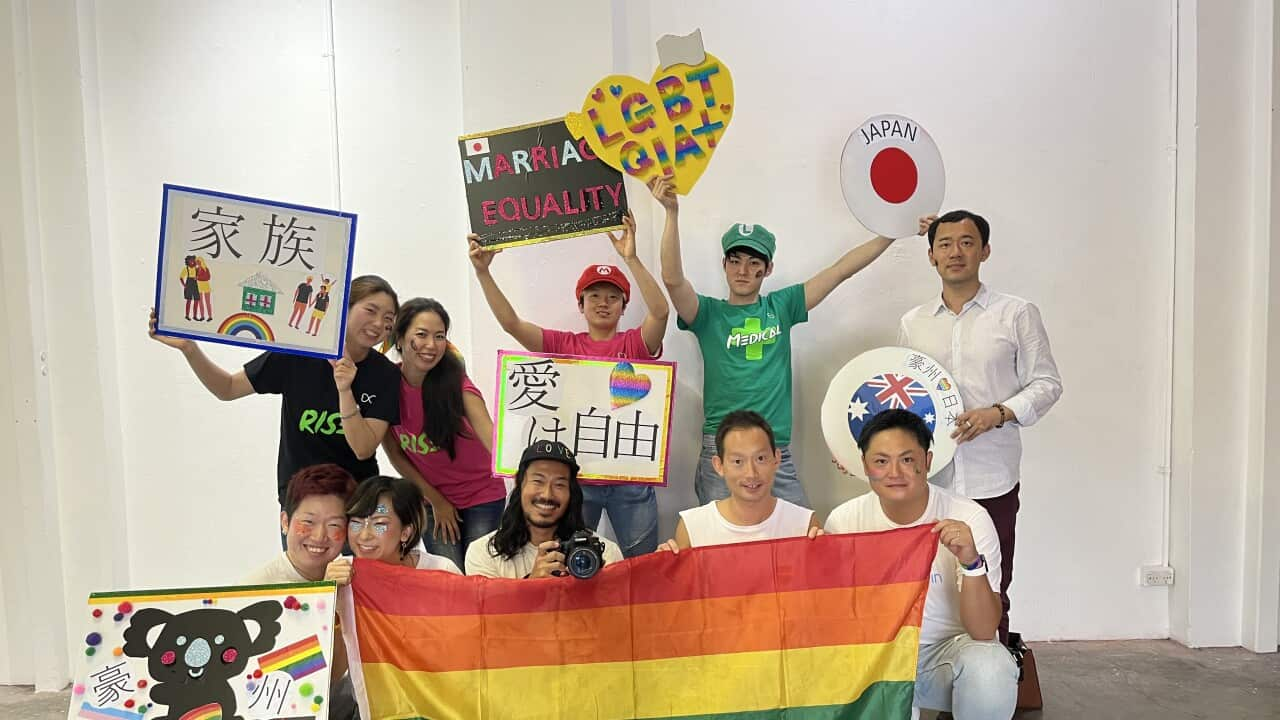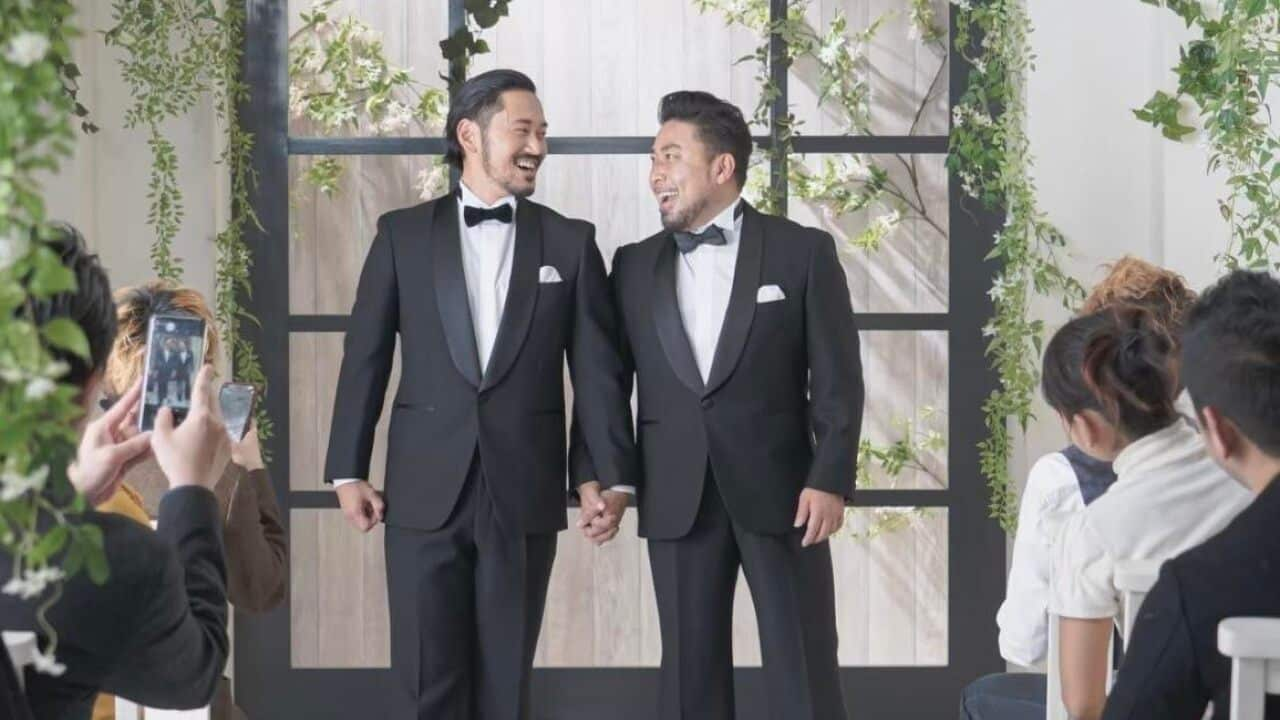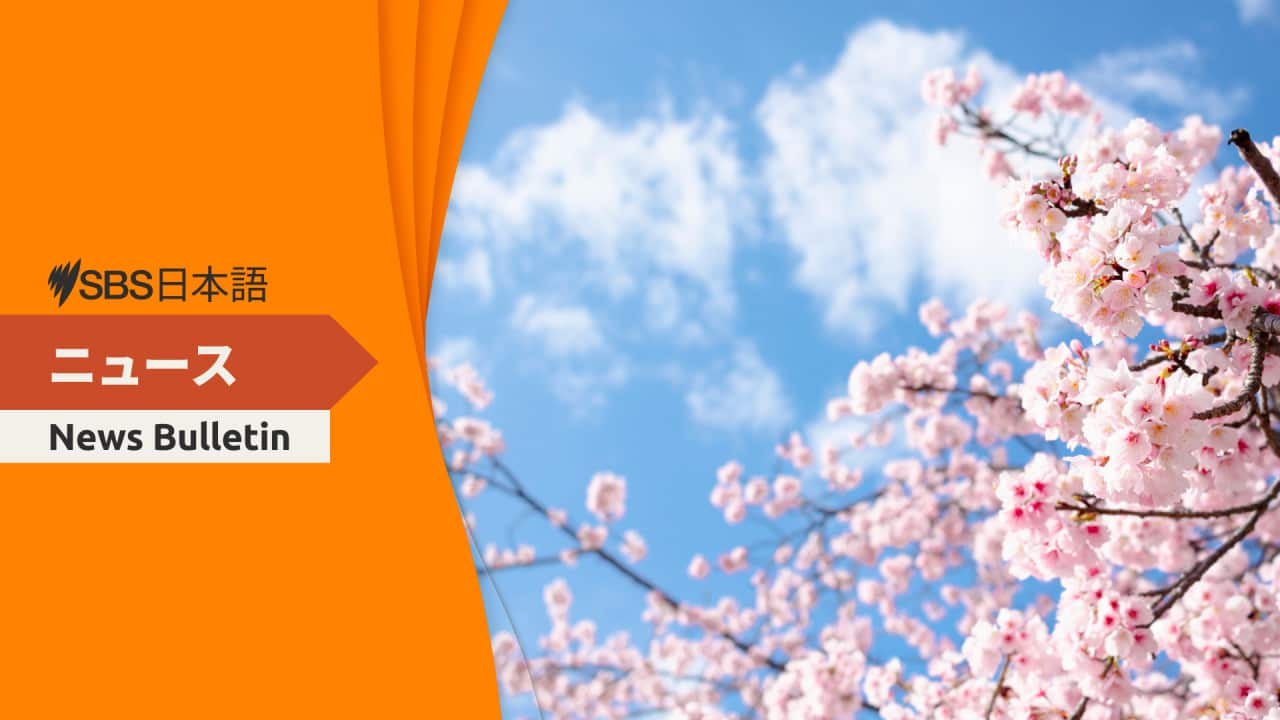Highlights
- Japan is the only country in the G7 that does not fully recognise same-sex marriage or partnership
- A Japanese group is participating in the Sydney Mardi Gras Parade this year hoping to send their message of marriage equality
- Taiwan's LGBTQI+ community shows support
Koki Yamada kept his trans identity hidden until he saw the Mardi Gras Parade for the first time in 2019, shortly after he arrived in Australia from Japan with his partner, Ayaka.
"I was blown away," Koki tells SBS Japanese.
"They were like me, yet unlike me they were all shining. Whether you identified as LGBTQI+ or not, it didn't matter, everyone was having such a great time."
Ayaka, who does not identify as LGBTQI+, says she was "truly touched" to see various companies and organisations come together to create such an inclusive event. "I think the LGBTQI+ community is still a minority in Japan because people like me, who do not identify with the community, do not get involved."
"I think the LGBTQI+ community is still a minority in Japan because people like me, who do not identify with the community, do not get involved."

Organizers of the Japanese float, Ayaka (left) and Koki (right) for Mardi Gras Parade 2022 Source: Toboji
"We wanted to be on the parading side this time," says Ayaka.
According to the organisers of the Mardi Gras Parade, although there is no clear record of past floats, it has been a while since a Japanese group has participated in the event.
Koichi Ogihara, who has been photographing the parade for many years, says he has "never seen a Japanese float" although individuals have participated as part of other organisations.
"People, in my time, have often been worried about how they were perceived by others," Koichi tells SBS Japanese.
I think this is a new wave. They have broken that barrier
While Koki's transgender identity is legally recognised in Japan under the controversial Gender Identity Disorder (GID) Special Cases Act, coming out about his identity to those around him was another story.
However, Australia helped changed that.
"The Australian society is very understanding of the LGBTQI+ community. It has helped me change into the person I am today," says Koki.
I don't think I really recognised that pain, until I came out and realised what the other side of the world was like.
Ayaka adds, "To see him shining, not in pain, and living with dignity makes me so happy."
Koki and Ayaka are a legally married couple. However, for Koki to obtain this status in Japan, he was required to become surgically sterile, a law which has been highly condemned by many, including the United Nations.
Although the need for reform has been recognised, there has been little progress. Even the name of the act itself is a reflection of Japan's outdated law - in 2019, the World Health Organization removed “gender identity disorder” from its .
"We want the world to know the situation in Japan," says Ayaka.
The couple are among a group of 20 people, dubbing themselves "Gender Free Japanese", that will attend Sydney's Mardi Gras Parade.
The group has contributed out of their own pockets for the production of a large flag, which will be central to their float, to spread a clear message of marriage equality to the world.
Push for change
For Yuji Nakagawa, this will be his second time participating in the Mardi Gras Parade. He participated as part of another organisation back in 2019, and wants to re-visit his "unforgettable" experience.
Like Koki and Ayaka, the debate over same-sex marriage in Japan is close to his heart.
"Although I am limited in what I can do, especially living abroad, I still want to be a part of this and push for change," Yuji tells SBS Japanese.

Yuji (right) will be participating in the Mardi Gras Parade for the second time this year Source: Yuji Nakagawa
Yuji arrived as a working holiday maker four years ago, and has called Australia home ever since. He has a partnership visa, which was introduced for same-sex couples in 1991.
“People are generally open here. We can bring out the term ‘gay’ in everyday conversation, and people don’t make a big deal out of it. They just accept it,” says Yuji.
In Japan people often react in surprise. I think the way people think about LGBTQI+ in Japan is different.
Yuji hasn't come out to his family or friends in Japan, but hopes that they realise and accept him through the Instagram posts he shares about his new life in Australia.
"People are entitled to different views, so there is no right or wrong. There is no law that says you must come out or stay hidden. I think there are things that people do not need to know."
A more inclusive future
Masaru is married with children, and does not identity as LGBTQI+. He says that the issue surrounding same-sex marriage is "not just about the LGBTQI+ community, but everyone who shares this environment together".
He wants to create a safe, respectful and inclusive society for future generations.

Masaru is participating in the parade in the hope of Japan becoming a more inclusive society for future generations Source: Masaru Ito
"If my children ever go back to Japan in the future, I hope for a society where there is no discrimination and which is inclusive, including of LGBTQI+."
He praises Australia for educating children from a young age not to discriminate on the basis of cultural background or sexual orientation.
"I received a formal letter from [my children's] school stating that they will not tolerate any form of discrimination. To have that in writing, really touched me."
"I want to see Japan become like Australia," says Masaru, adding that he will be parading in the Mardi Gras for this very reason.

”Gender Free Japanese" preparing for the 2022 Mardi Gras Parade Source: Kouki Yamada
Same-sex partnership
In 2015, Tokyo's Shibuya ward became the first in Japan to introduce a "same-partner certificate". While the certificate is not legally binding, and does not provide the various benefits given to married couples, it started a conversation around the country.
According to a survey conducted by , over 30 per cent of the 146 local governments in Japan have introduced the same-sex partnership system so far.
Last March, Sapporo District Court made a landmark ruling that Japan's failure to recognise same-sex marriage is unconstitutional, the first of its kind, and similar lawsuits are taking place in other areas. Akiyoshi Miwa, a lawyer involved in a similar lawsuit in Osaka and a representative director for , says the ruling in Sapporo was "historical".
Akiyoshi Miwa, a lawyer involved in a similar lawsuit in Osaka and a representative director for , says the ruling in Sapporo was "historical".

Sapporo District Court ruled that the Japanese government's failure to recognise same-sex marriage is unconstitutional. Sapporo, Hokkaido prefecture on March 17, 2021 Source: STR/JIJI PRESS/AFP via Getty Images
"For the district court to say that it is unconstitutional, that is very rare," Akiyoshi tells SBS Japanese.
"Parliamentarians can no longer avoid this issue."
Akiyoshi says that support for same-sex marriage is growing by the day in Japan, pointing out that public opinion polls show that people are more in favour of same-sex marriage than against.
"I believe that society as a whole is ready to accept same-sex marriage, but there is a lack of progress in terms of the law."
Support from afar
"Gender Free Japanese" may be a small group, but their actions have been noticed by the LGBTQI+ community of Taiwan, which was the first Asian nation to legalise same-sex marriage.
Guzifer Leong, who is the chair of 2025 World Pride Taiwan Preparation Committee, has advocated for same-sex marriage in the country for many years.
He says that voicing out for human rights, whether LGBTQI+ or not, is simply in the "pride spirit" and that the Mardi Gras Parade is a platform to "connect" over shared experiences.
Guzifer, who is originally from Macau, recently married his Taiwanese partner, after successfully suing the Taiwan government to allow for transnational same-sex marriage, which is yet to be legalised. Guzifer says activist groups can learn a lot from the experiences of those in other countries. Although the laws, cultures and societies may differ, the challenges overcome by other groups can serve as inspiration.
Guzifer says activist groups can learn a lot from the experiences of those in other countries. Although the laws, cultures and societies may differ, the challenges overcome by other groups can serve as inspiration.

Guzifer says events such as the Mardi Gras is a great way to show the positive elements of the LGBTQi+ culture Source: Guzifer Leong
The parade also shows, he says, that "LGBTQI+ culture is good, funny, happy, not negative... that society will not break down after same-sex marriage is legalised. It's important to let them [society] know that."
Charley Chen is joining the Japanese group this year to show his support. He has been part of the Chinese float in previous years, but the group is not participating this year for various reasons including COVID-19.
I want to let everyone know that there are people who still need love because the law won't let them marry and live together.
"Japan should come out and fight for it."
"Gender Free Japanese" will parade along the Sydney Cricket Ground on 5 March, 2022, with choreography that anyone and everyone can join in with.
LISTEN TO

同性婚への思いを掲げて参加 マルディグラ・パレード2022
SBS Japanese
15/02/202214:11
Listen to SBS Japanese Radio on Tue, Thu and Sat from 10pm







